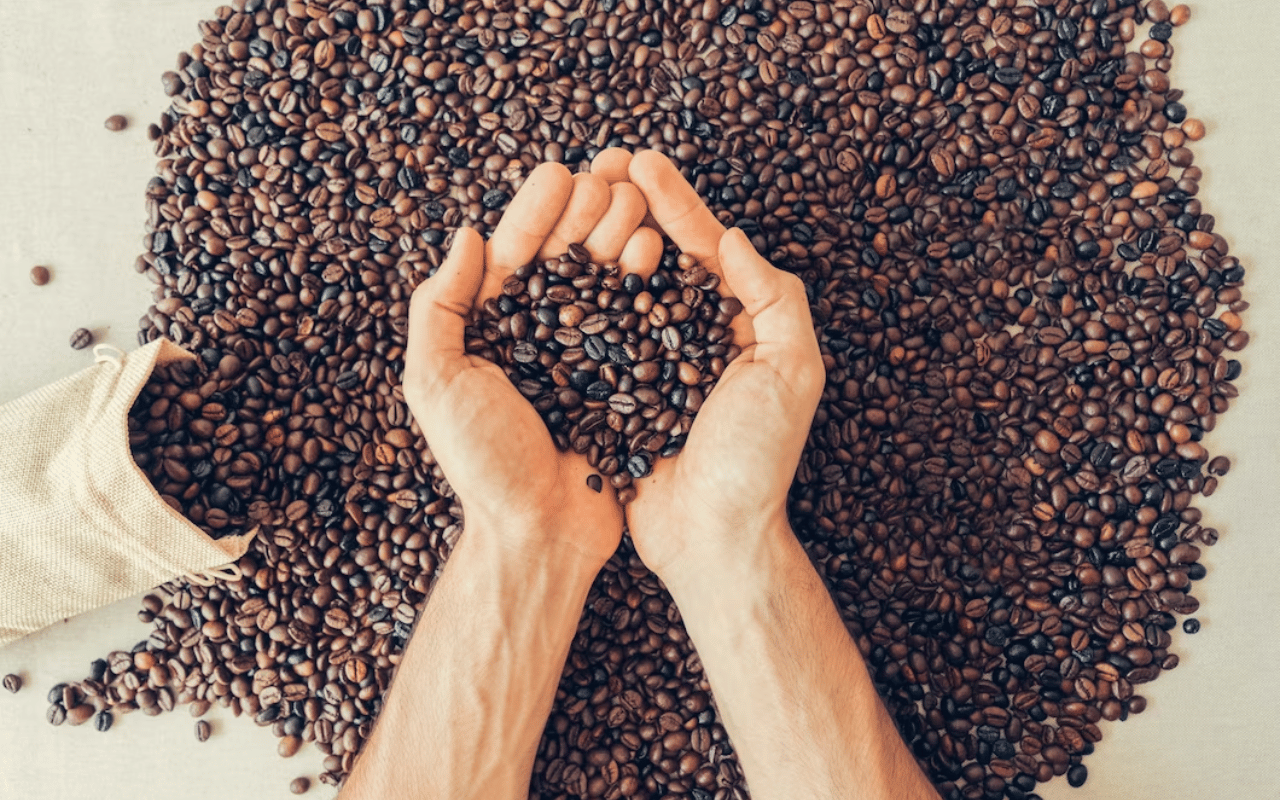The seeds of the coffee plants are called coffee beans. Coffee beans have several compounds, including caffeine, chlorogenic acids, vitamin B3, magnesium, and potassium. Eating coffee beans benefits comes from these compounds.
In this article, we will take a look at the drawbacks and potential benefits of eating coffee beans, their nutritional values, and the safe consumption of coffee beans.
Nutritional Value of Coffee Beans
Caffeine: 2-4% of dry weight
Chlorogenic acids: 7-10% of green coffee beans
Vitamin B3 (Niacin): A 1 oz serving contains ~11% of the RDI
Magnesium: 6% of the RDI per serving
Potassium: 9% of the RDI in 1 oz of beans
Fiber: 16% of the RDI per 1 oz serving
Potential Benefits of Eating Coffee Beans
There are two popular types of coffee beans, Arabica and Robusta, which have different characteristics and caffeine content. Some research suggests that consuming whole, lightly roasted coffee beans may offer certain Benefits:
Provides Antioxidants
Chlorogenic acids are powerful antioxidants that may help neutralize free radicals and reduce oxidative stress in the body when consumed. However, they dissipate greatly during roasting. Lightly roasted beans retain more antioxidant chlorogenic acids.
Whole coffee beans are packed with antioxidant compounds like caffeic acid and hydrocinnamic acid[1]. These antioxidants can help neutralize damaging free radicals and combat inflammation when consumed directly.
Aids Weight Loss
The rich amount of fiber and caffeine in coffee beans can promote weight loss by increasing fullness and boosting metabolism. The chlorogenic acid in coffee beans may also help weight loss.
Coffee beans are rich in chlorogenic acid, which may help promote weight loss by modifying fat metabolism[2] and lowering insulin levels[3]. Eating the beans provides more direct chlorogenic acid than drinking brewed coffee.
Natural Energy
The caffeine in coffee beans provides a natural energizing effect by blocking adenosine receptors in the brain[4]. Eating the beans allows for slower absorption and longer lasting energy supplementation.
Dental Health
Compounds in coffee beans may inhibit bacteria that contribute to plaque and dental caries[5]. The abrasive texture can also help remove food debris and stains from tooth enamel when chewed.
Reduces Risk of Chronic Diseases
High coffee consumption is linked with a lower risk of diseases like diabetes, heart disease, and liver conditions, based on some studies. The antioxidant compounds in coffee beans like Arabica may help reduce the risk of chronic diseases, but more research is necessary.

Potential Downsides of Eating Coffee Beans
Despite the potential upside, eating coffee beans raw has some important downsides to consider:
Caffeine Content
While caffeine offers benefits like increased energy and alertness in moderation, eating coffee beans provides a very concentrated amount of caffeine. Consuming too much can lead to jitteriness, anxiety, headaches, and sleeping problems.
Gastrointestinal Issues
The high fiber content of whole beans like Robusta combined with caffeine can cause digestive upset like bloating, cramps, and diarrhea when consumed in large amounts. It’s best to limit portion sizes.
Coffee beans are hard to digest and the fibrous texture can cause digestive irritation, nausea, or constipation when consumed whole[6].
Nutrient Inhibition
Compounds in coffee like chlorogenic acid may inhibit the absorption of some nutrients like iron and thiamine[7]. This could lead to nutritional deficiency with high bean consumption.
Effect on Medications
The caffeine in coffee beans can interact with certain medications, including lithium, Clozaril, and some antibiotics. It’s best to consult a doctor before eating beans regularly.

How to Safely Consume Coffee Beans?
If you wish to eat coffee beans, here are some tips to reduce potential downsides:
Recommended Serving Size
Limit portion to around 1-2 tablespoons of beans per day to minimize the risk of side effects. This contains 140-200mg of caffeine.
Opt for Lightly Roasted Beans
Choose beans with cinnamon or light brown roast. This preserves more antioxidant chlorogenic acids than dark roasts.
Watch Out for Allergies
Some people have allergies to compounds in coffee beans. Discontinue use if any hypersensitivity reactions occur.

Who Should Avoid Eating Coffee Beans?
The following individuals should generally avoid consuming coffee beans:
- Those sensitive or allergic to compounds in beans
- People with gastrointestinal issues like reflux or ulcers
- Individuals watching caffeine intake
- Pregnant women and breastfeeding mothers
- Children and adolescents
Eating a few beans in moderation is unlikely to cause harm for most healthy adults. However, drinking brewed coffee is still the safest way to enjoy coffee.
Conclusion
Eating a small amount of lightly roasted coffee beans may provide some nutritional benefits from compounds like chlorogenic acid, antioxidants, fiber, and caffeine for energy. However, overdoing it can definitely lead to side effects. Stick to a reasonable serving size, opt for light roasts, and discontinue use if any worrisome reactions occur. For most people, sipping an occasional cup of joe is a safer way to reap the perks of coffee.
References
- Daglia M., Racchi M., Papetti A., Lanni C., Govoni S., Gazzani G. (2004). In vitro and ex vivo antihydroxyl radical activity of green and roasted coffee. J. Agric. Food Chem. 52, 1700–1704.
- Thom, E., The effect of chlorogenic acid enriched coffee on glucose absorption in healthy volunteers and its effect on body mass when used long-term in overweight and obese people. Journal of Intercational Medical Research, 2007.
- Tunnicliffe JM, Shearer J. Coffee, glucose homeostasis, and insulin resistance: physiological mechanisms and mediators. Appl Physiol Nutr Metab. 2008;33(6):1290-1300.
- Nehlig A. (2010). Is Caffeine a Cognitive Enhancer?. Journal of Alzheimer’s disease : JAD, 20 Suppl 1(Suppl 1), S85–S94.
- Almeida A. A. P. de, Naghetini C. C., Santos V. R. dos, Antonio A. G., Farah A., Glória M. B. A. (2012). Influence of natural coffee compounds, coffee extracts and increased levels of caffeine on the inhibition of Streptococcus mutans. Food Res.
- Boekema, P. J., Samsom, M., van Berge Henegouwen, G. P., & Smout, A. J. (1999). Coffee and gastrointestinal function: facts and fiction: a review. Scandinavian journal of gastroenterology. Supplement, 230, 35–39.
- Morck, T. A., Lynch, S. R., & Cook, J. D. (1983). Inhibition of food iron absorption by coffee. The American journal of clinical nutrition, 37(3), 416–420.

